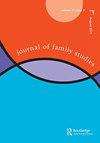Contextualizing the work-family experiences of women in the Nigerian banking industry
IF 1.6
4区 社会学
Q3 FAMILY STUDIES
引用次数: 0
Abstract
ABSTRACTAt the intersection of culture, ethnicity, gender, and religion, this paper offers insights into the lived experiences of Nigerian women by adopting Nkomo and Ngambi’s multilevel framework on African women’s leadership to understand their work-family experiences in the Nigerian banking sector. Employing data from interviews with eleven Northern women and ten Southern women who live in the following states: Kano, Kaduna; Akure, Lagos, Ibadan; and Abuja, the Federal Capital Territory, the findings confirm the existence of patriarchal systems at the macro (social), meso (organizational), and micro (individual) levels of social action that shape Nigerian women’s work-family experiences. Nevertheless, as tradition and modernity interact to provide a hybrid social space within which these women negotiate the different levels, they demonstrated the ability to redefine femininity and womanhood and reject constraints that confine them. The women from both regions resisted conformity to the patriarchal systematic ideologies and cultural processes that placed them in a disadvantaged position. Despite social and cultural criticisms that restrict women’s movement and career options, their agency was evident in their narratives.KEYWORDS: Gendergender normswomenwomen in bankingNorthern/Southern womenculture AcknowledgementsFirstly, we would like to thank the study participants for agreeing to participate in this study. We would also like to thank the editor and the two anonymous reviewers for their highly constructive feedback and suggestions.Disclosure statementNo potential conflict of interest was reported by the author(s).Additional informationFundingThis research did not receive any specific grant from funding agencies in the public, commercial, or not-for-profit sectors.尼日利亚银行业妇女工作家庭经历的背景
摘要在文化、种族、性别和宗教的交叉点上,本文通过采用恩科莫和恩甘比关于非洲妇女领导的多层次框架来理解她们在尼日利亚银行业的工作-家庭经历,从而深入了解尼日利亚妇女的生活经历。采用对生活在以下州的11名北方妇女和10名南方妇女的访谈数据:卡诺、卡杜纳;阿库雷,拉各斯,伊巴丹;和联邦首都地区阿布贾的调查结果证实,父权制度在宏观(社会)、中观(组织)和微观(个人)社会行动层面的存在,塑造了尼日利亚妇女的工作-家庭经历。然而,随着传统和现代的相互作用,提供了一个混合的社会空间,这些女性在其中谈判不同的层面,她们展示了重新定义女性气质和女性气质的能力,并拒绝限制她们的约束。来自这两个地区的女性都拒绝遵从男权制度的意识形态和文化进程,这使她们处于不利地位。尽管社会和文化的批评限制了妇女的运动和职业选择,但她们的能动性在她们的叙述中是显而易见的。关键词:性别性别规范银行业女性北方/南方女性文化致谢首先,我们要感谢研究参与者同意参加本研究。我们还要感谢编辑和两位匿名审稿人提供的非常有建设性的反馈和建议。披露声明作者未报告潜在的利益冲突。本研究没有从公共、商业或非营利部门的资助机构获得任何特定的资助。
本文章由计算机程序翻译,如有差异,请以英文原文为准。
求助全文
约1分钟内获得全文
求助全文
来源期刊

Journal of Family Studies
FAMILY STUDIES-
CiteScore
3.20
自引率
12.50%
发文量
52
期刊介绍:
The Journal of Family Studies is a peer reviewed international journal under the Editorship of Adjunct Professor Lawrie Moloney, School of Public Health, LaTrobe University; Australian Institute of Family Studies; and co-director of Children in Focus. The focus of the Journal of Family Studies is on the wellbeing of children in families in the process of change.
 求助内容:
求助内容: 应助结果提醒方式:
应助结果提醒方式:


